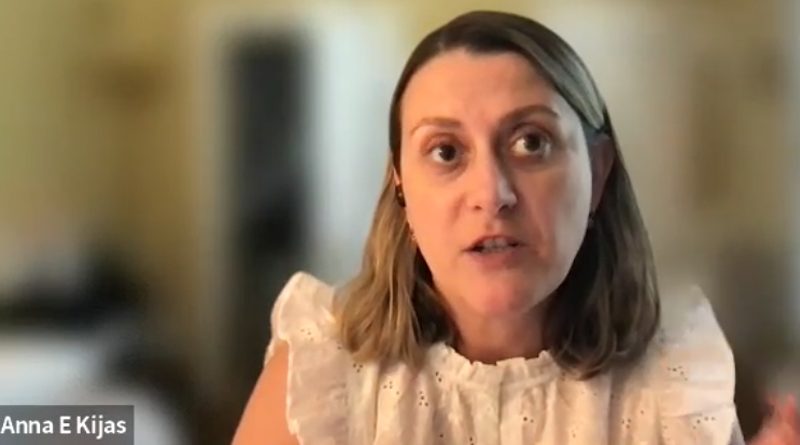Interview with Anna Kijas on the “Saving Ukrainian Cultural Heritage Online” Project
By Alex Avaneszadeh, MALD 2023 Candidate, The Fletcher School
On June 10, 2022, the Fletcher Russia and Eurasia Program’s Communications Assistant, Alex Avaneszadeh, interviewed the co-organizer of the Saving Ukrainian Cultural Heritage Online (SUCHO) Project, Anna Kijas. The conversation revolved around the project’s purpose and goals, what currently drives the project, and how Kijas’ work intersects with the initiative. The SUCHO project website launched on March 1, 2022, in response to Russia’s invasion of Ukraine, with the aim to preserve Ukrainian cultural heritage which remains under threat due to the war. In addition to her work with SUCHO, Kijas is the head of Tufts University’s Lilly Music Library and is a musicologist whose work is focused on the digital humanities.
Kijas began the interview by illustrating the SUCHO project as an initiative that was “established to address the issue of digital artifacts that are representative of Ukrainian cultural heritage, which may be at risk of being damaged, destroyed, or disappearing.” In particular, the SUCHO project aims to “find as much digital content as accessible online and to help safeguard it in case anything is damaged such as servers or files, which we could keep web archived and preserved for a short duration until we can give them back to the institutions if they need it,” said Kijas.
The SUCHO project also supports and works with various Ukrainian institutions, whether they be public or private, including the national archives, libraries, museums, and monasteries which have operational servers and digital archives where artifacts such as music scores and manuscripts are stored.
Regarding her involvement in the SUCHO project, Kijas explained that she had been planning a web archiving workshop for an annual music library conference several days before Russia’s invasion of Ukraine. She wanted the workshop to focus on music collections in Ukrainian institutions “that have some kind of digital footprint, meaning these objects have been fully digitized, or there is metadata accessible through a library catalog.”
As a musicologist, Kijas had been involved in similar initiatives before and had publicized the workshop, saying, “I got the word out via Twitter and hundreds of people signed up. It was just this immense response.” One of these responses was from the current co-founder of SUCHO, Sebastian Majstorovic, a digital humanities specialist in Austria who reached out and wanted to build a project that looked beyond just music archiving. After the SUCHO project website was established on March 1, 2022, there were over 1000 volunteers who signed up by the end of the first week to work on the project.
“The three of us who founded [the SUCHO project] weren’t thinking about doing something at this scale until the invasion happened, and we realized that this is serious and that it won’t go away in a few days. There is a real chance that a lot of this information and cultural heritage that has been digitized could potentially disappear,” explained Kijas.
She went on further to highlight that the SUCHO volunteers range from people who have no technical programming expertise to people with strong software development and programming skills. That said, some volunteers have expertise in risk management and try to identify digitized heritage on servers in regions of Ukraine that are being more heavily targeted by the Russian military, to preserve them in case these servers are destroyed.
Kijas also highlighted that the primary tool that SUCHO utilizes for digital humanities is Web Recorder, which “allows us to create high fidelity playback files of entire websites…as if you were visiting that website the day it was web archived.” If those files were on a server that was destroyed, this playback allows for the re-creation of that content if the institution needs those files.
Amazon is also supporting SUCHO by giving the project free storage on Amazon Web Services. Amazon in Poland is also going to deliver pieces of equipment, such as cameras and scanners, freely through Poland to Ukraine, to reach Ukrainian institutions that are looking to digitize their artifacts. This underscores how SUCHO is not only creating a database that houses all types of Ukrainian cultural heritage, but is also building the capacities of Ukrainian institutions to do the same as the war continues.
With SUCHO’s increasing visibility, Kijas mentioned that “in early April, we were contacted by UNESCO…and have been meeting with them every few weeks on helping save and preserve cultural heritage in Ukraine. UNESCO is focused on physical artifacts and not necessarily digital, but they’re turning to us to help them identify what we can do in the future to prevent this crisis from happening so we don’t have to have an initiative like SUCHO.”
SUCHO’s digital archives are open source, aligning with the work of librarians and libraries in making their resources open and accessible to all.

